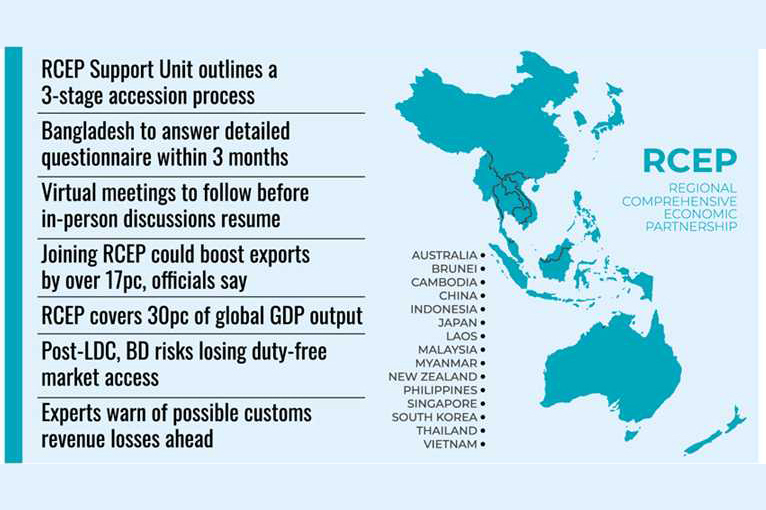Bangladesh's RCEP bid enters formal evaluation stage
Delegation's Jakarta visit deferred as ASEAN Secretariat initiates detailed assessment

Published :
Updated :

Bangladesh's pursuit of membership in the world's largest trade bloc -- the Regional Comprehensive Economic Partnership (RCEP) -- has officially entered a structured evaluation process, marking a key step in the country's bid to join the Asia-Pacific trade grouping.
A planned visit by a Bangladeshi delegation to the ASEAN Secretariat in Jakarta has been deferred, as the RCEP Support Unit has opted to begin with a comprehensive virtual assessment before hosting in-person discussions.
The Ministry of Commerce (MoC), in coordination with the Ministry of Foreign Affairs (MoFA) and the Bangladesh Embassy in Jakarta, had initially proposed sending the delegation on either October 8-9 or October 15-16 to discuss Bangladesh's RCEP membership.
The RCEP Support Unit in Jakarta has outlined a three-stage accession protocol and sent it to the Bangladesh Embassy in Indonesia. The process begins with the issuance of a detailed questionnaire to the Bangladesh government, designed to gather data on the country's economic structure, technical readiness, and ability to meet RCEP commitments.
"The questionnaire will focus on Bangladesh's potential for market expansion and its capacity to access RCEP member economies through the bloc's trade framework," a Ministry of Foreign Affairs (MoFA) letter said.
The government has been given three months to complete and return the questionnaire. Following submission, the RCEP Support Unit plans to hold one or more virtual meetings with the Bangladesh delegation to discuss the responses in detail.
The ASEAN Secretariat informed that in-person discussions in Jakarta will be scheduled only after these online consultations are completed.
An official involved in the process said the decision effectively marks "the true beginning" of Bangladesh's RCEP accession journey, as it now requires the mobilisation of inter-ministerial resources to prepare detailed technical responses within the deadline.
When contacted, Commerce Secretary Mahbubur Rahman confirmed the postponement of the proposed visit, saying, "We had initially planned to visit Jakarta to discuss the terms of Bangladesh's accession. However, the RCEP Support Unit had some preparation issues and communicated with our Foreign Affairs Ministry about it. A MoFA representative will be included in the delegation when the visit takes place."
He could not specify when the visit might be rescheduled.
BACKGROUND, PROSPECTS
An inter-ministerial meeting held in August 2023 under the previous government had recommended joining RCEP, following an assessment suggesting that accession could increase Bangladesh's exports by over 17.37 per cent and raise GDP by 0.26 per cent.
The Ministry of Commerce has already completed preliminary reviews based on the commitments fulfilled by Vietnam -- one of RCEP's founding members.
The RCEP, which came into force in January 2022, brings together 15 Asia-Pacific nations -- the ten ASEAN members (Brunei, Cambodia, Indonesia, Laos, Malaysia, Myanmar, the Philippines, Singapore, Thailand, and Vietnam) along with Australia, China, Japan, New Zealand, and South Korea.
It is the world's largest free-trade arrangement, covering about 30 per cent of global GDP, one-third of the world's population, and nearly $12.7 trillion in global trade.
STRATEGIC SIGNIFICANCE
Bangladesh currently enjoys preferential market access to many RCEP economies through PTAs or GSP schemes, but these will largely expire after its graduation from LDC status in 2026. Without RCEP membership, the country risks losing duty-free access to several major export markets.
RCEP countries already account for a significant portion of Bangladesh's trade profile -- representing around 44 per cent of total imports, 55 per cent of total tax revenue, and 58 per cent of customs duty receipts, according to FY21 data.
However, experts warn that accession could lead to revenue losses from customs duties, particularly on imports from China, Japan, Thailand, South Korea, Indonesia, Malaysia, and Australia -- Bangladesh's major import sources within the bloc.
More than 68 per cent of Bangladesh's exports to RCEP members are apparel products, which make up 64 per cent of its top 20 export items to these markets.
While RCEP accession could open new markets and strengthen regional supply chain links, analysts caution that Bangladesh's comparatively higher tariffs and limited export diversification could pose challenges during integration.
The RCEP negotiations were first launched in 2012 during the ASEAN Summit in Cambodia. With its formal assessment phase now underway, Bangladesh stands at the threshold of potentially joining the world's most dynamic trade network -- one that could reshape its export landscape and post-LDC trade strategy.
rezamumu@gmail.com


 For all latest news, follow The Financial Express Google News channel.
For all latest news, follow The Financial Express Google News channel.